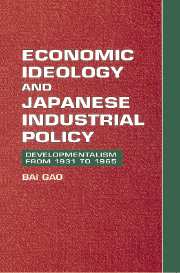Book contents
- Frontmatter
- Contents
- Acknowledgments
- List of abbreviations
- Note on Japanese usage
- 1 Introduction
- 2 The Ideology of Japanese developmentalism
- 3 The managed economy
- 4 Priority production
- 5 Promoting exports
- 6 High growth and liberalization
- 7 The institutional environment of economic reasoning
- Epilogue: Japanese developmentalism in historical perspective
- References in English
- References in Japanese
- Index
5 - Promoting exports
Published online by Cambridge University Press: 29 March 2010
- Frontmatter
- Contents
- Acknowledgments
- List of abbreviations
- Note on Japanese usage
- 1 Introduction
- 2 The Ideology of Japanese developmentalism
- 3 The managed economy
- 4 Priority production
- 5 Promoting exports
- 6 High growth and liberalization
- 7 The institutional environment of economic reasoning
- Epilogue: Japanese developmentalism in historical perspective
- References in English
- References in Japanese
- Index
Summary
Promoting exports was the leading paradigm of Japanese industrial policy in the 1950s. This paradigm had a profound effect on the Japanese economic system. Unlike the 1946–9 period, in which the wartime legacies were either challenged or were simply inherited without much adaptation, Japanese developmentalism in the 1950s demonstrated a strong capacity for innovation in the new environment. It started the transformation from the military version to a trade version for peacetime.
Kenneth Pyle (1992:139-40) writes that the United States twice played an important role in transforming the organizing structure of regional politics in Asia after both world wars ended. The establishment of the Pax Americana after World War II shaped Japan's postwar order. “The extraordinary rise of Japan as an economic superpower is, to a considerable extent, the result of this special relationship [with the United States]” (Pyle 1992:141). Beginning at the end of the 1940s, the Pax Americana determined the external environment of the Japanese economy in two decisive ways. First, the implementation of the Dodge Plan in 1949 directly linked the Japanese economy with the international market. As discussed in Chapter 3, Japan's wartime economic system had a strong anticapitalist orientation, marked by restraints on market competition and the rejection of the profit principle. In 1946–9, due to various structural factors, the managed economy not only continued but was even enhanced. When Japan was again forced to survive international competition after more than one decade's isolation, competitiveness and efficiency became the top issues in Japanese industrial policy.
- Type
- Chapter
- Information
- Economic Ideology and Japanese Industrial PolicyDevelopmentalism from 1931 to 1965, pp. 173 - 224Publisher: Cambridge University PressPrint publication year: 1997



